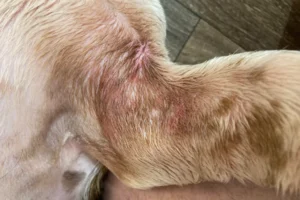It’s frustrating when your cats are constantly itching, but there are no fleas to blame. So why exactly are they scratching so much? Here’s the answer you’ve been looking for.
Without further ado, let’s get to the bottom of why your cats may be itching without any fleas present.
Food Allergies:
If you’re wondering why your cats are itching but no fleas are to blame, food allergies could be the culprit. Just like humans, cats can develop allergies to certain foods, leading to itchiness and skin irritation. It’s essential to observe your cat’s diet and consider any recent changes that could be triggering allergic reactions.
To address food allergies, try eliminating common allergens such as grains, dairy, and artificial additives from your cat’s food. Instead, opt for high-quality grain-free options or limited ingredient diets. Consult your vet for recommendations on hypoallergenic cat food brands to ease your cat’s itching.
Additionally, keep track of any symptom changes after switching diets, as this can help narrow down the trigger foods causing itchiness in your feline friend. By being proactive and mindful of your cat’s dietary needs, you can help alleviate their discomfort and promote a healthier skin and coat.
Tip: Consider rotating protein sources in your cat’s food to reduce the risk of developing new allergies.
Environmental Allergies:
When it comes to cats, itching without fleas could be a sign of environmental allergies. Pollen, dust, mold, and other environmental triggers can cause skin irritation and excessive scratching in sensitive felines. It’s crucial to identify and address these allergens to bring your cat some much-needed relief.
Keep your home clean and dust-free, especially in areas where your cat spends a lot of time. Consider investing in an air purifier to filter out allergens and improve your cat’s indoor air quality. Regularly groom your cat to remove pollen and other irritants from their fur.
If your cat experiences severe itching due to environmental allergies, consult your vet for medication and treatment options. Antihistamines, topical creams, or steroids may be prescribed to alleviate symptoms and improve your cat’s comfort.
Remember, environmental allergies can vary seasonally, so monitor your cat’s condition throughout the year. By being attentive to potential triggers, you can help manage your cat’s itching effectively.
Skin Infections:
Is your furry friend incessantly scratching but you can’t seem to find any pesky fleas? Well, it’s time to consider the possibility of skin infections. Just like humans, cats can also fall victim to various skin conditions that can cause intense itching. Conditions such as allergies, fungal infections, and parasitic infections can all lead to your cat scratching non-stop. It’s essential to schedule a visit to the vet to rule out any underlying skin infections and provide your kitty with the necessary treatment to soothe their discomfort.
In addition to skin infections, stress and anxiety could be causing your cat to scratch excessively. Cats are sensitive creatures that can easily get stressed, leading to behavioral issues like excessive grooming and scratching. If you’ve noticed a recent change in your cat’s environment or routine, it may be triggering their anxiety. Creating a stress-free environment, providing plenty of playtime, and offering comforting routines can help alleviate your cat’s stress and reduce their urge to scratch. Remember, a happy cat is a healthy cat!
Parasites Other Than Fleas:
If your cats are itching but you’ve ruled out fleas, there are other parasites that could be causing the irritation. One possible culprit is ear mites, tiny parasites that are often found in the ears of cats. These mites can cause intense itching and discomfort for your feline friends. Another parasite to consider is ringworm, a contagious fungal infection that can affect the skin, causing itching and hair loss. It’s essential to consult with your vet to properly diagnose and treat any potential parasite infestations to provide relief for your cats.
Other Parasites Checklist: 1. Ear Mites: Check for dark discharge in your cat’s ears. 2. Ringworm: Look for circular patches of hair loss on your cat’s skin. 3. Cheyletiella Mites: Consider these mites if your cat’s skin is flaky and itchy.
Dry Skin:
Dry skin can also be a common culprit in your cats’ itching issues, especially during the winter months when the air is dry. Just like humans, cats can suffer from dry, flaky skin that can lead to itching and discomfort. Ensure your cats are getting enough moisture in their diet and consider adding a humidifier to your home to help combat the dry air. Additionally, bathing your cats too frequently can strip their skin of natural oils, leading to dryness and itching. If dry skin is the root of the itching problem, your vet may recommend special shampoos or supplements to help alleviate the issue.
Remember, keeping your cats well-groomed and hydrated can go a long way in preventing dry skin and the resulting itching.
Grooming Habits:
If you’ve noticed your cats itching but can’t find any fleas, their grooming habits might be to blame. Sometimes, cats may not groom themselves effectively, leading to skin irritation and itching. Check if your cats have any mats or knots in their fur that could be bothering them. Regular brushing can help remove these tangles and improve their grooming habits. Ensure your cats are on a balanced diet, as nutritional deficiencies can also contribute to skin issues. Moreover, consider providing a calming environment to reduce stress, as cats may overgroom when anxious. By addressing their grooming habits, you may help alleviate their itching.
Underlying Health Conditions:
While fleas are a common culprit for itching in cats, several underlying health conditions could be causing your feline friends’ discomfort. Allergies, such as flea allergy dermatitis or food allergies, can lead to itchy skin even in the absence of fleas. Skin infections, mites, or fungal issues could also be at play. Keep an eye out for symptoms like redness, scabs, or hair loss along with the itching. If you suspect a health issue, consult your veterinarian for a proper diagnosis and treatment plan tailored to your cats’ specific needs. Remember, identifying the root cause is key to helping your cats find relief from their itching.
- Look out for any changes in your cats’ behavior or grooming routine.
- Consider scheduling a visit to the vet for a thorough examination.
- Address potential health conditions promptly to prevent further discomfort for your cats.
Fun Fact About Cats:
Did you know that cats spend up to half of their waking hours grooming themselves? This fastidious behavior helps them stay clean and regulate their body temperature. It’s no wonder they are such well-groomed creatures!
Tips for Relief:
If your cats are itching but there are no fleas in sight, it could be due to allergies, dry skin, or even stress. Here are some practical tips to help relieve their discomfort:
- Consult Your Veterinarian: Schedule a visit to rule out any underlying health issues causing the itching.
- Switch up Their Diet: Some cats can be sensitive to certain ingredients in their food. Consider trying a diet with different protein sources to see if it helps.
- Invest in a Humidifier: Dry air can exacerbate itching. Adding moisture to the air can help relieve dry skin.
- Regular Grooming: Brushing your cats regularly can help remove excess fur and distribute natural oils, promoting healthier skin.
- Use Gentle Shampoos: Opt for gentle, hypoallergenic shampoos specifically made for cats to avoid irritation.
- Provide Environmental Enrichment: Keeping your cats mentally stimulated and stress-free can help reduce itching caused by anxiety.
Remember, it’s essential to address the root cause of your cats’ itching to provide them with long-term relief.
Alex, a passionate animal lover, has experience in training and understanding animal behavior. As a proud pet parent to two dogs and three cats, he founded AnimalReport.net to share insights from animal experts and expand his knowledge of the animal kingdom.




